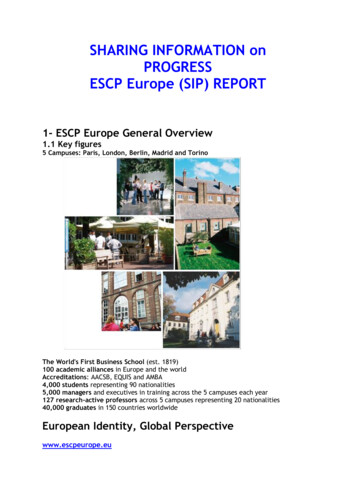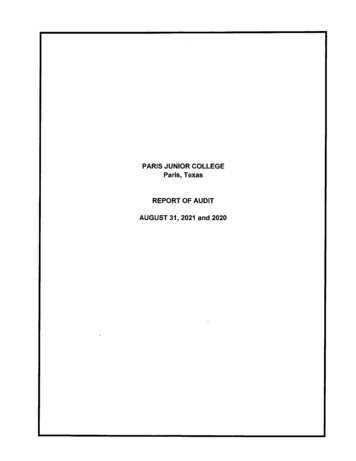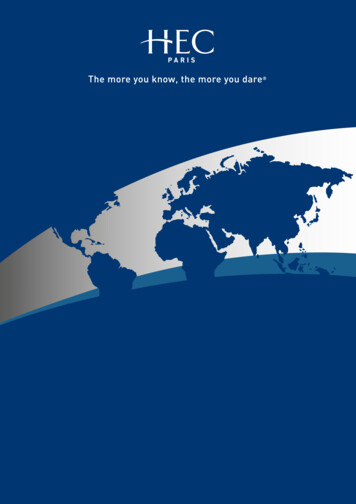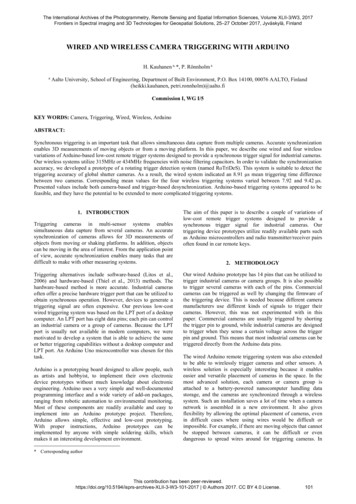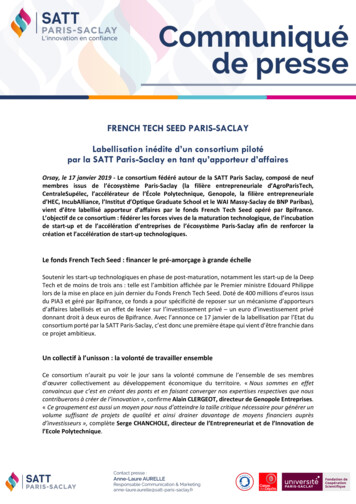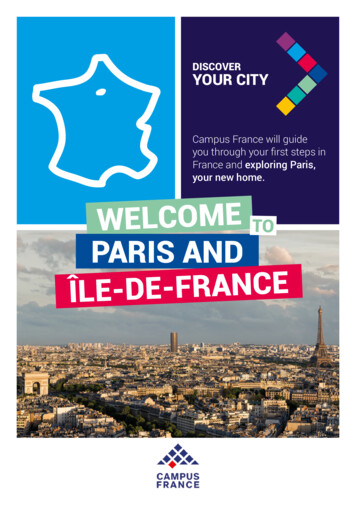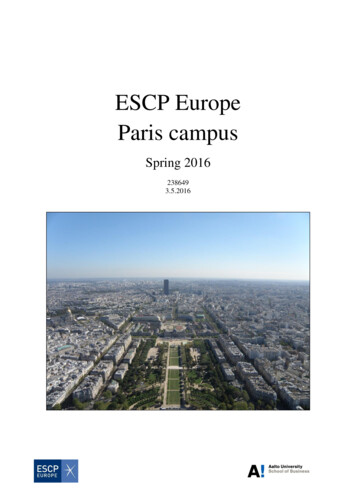
Transcription
ESCP EuropeParis campusSpring 20162386493.5.2016
ESCP Europe Paris, FranceExchange report – Spring 2016Table of ContentsOverview . 2Preparing for Exchange . 2Application process . 2Getting to ESCP Europe . 3Exchange studies . 3Orientation . 3Courses in general . 4Signing up for courses . 4Selected courses . 5Free time and other information . 7Getting to know other students . 8Traveling in France and abroad . 8Accommodation . 9Costs . 9Living in Paris . 10Final comments . 111
ESCP Europe Paris, FranceExchange report – Spring 2016OverviewESCP Europe is the oldest business school in the world and one of France’s world-renownedGrandes Écoles. Together with its two other Parisian peers, also HEC and ESSEC, ESCP ranks notonly among the best rated business schools in France, but also among the highest rated in theWorld, placing 3rd in the Financial Times’ 2015 Masters in Finance ranking and 7 th in the 2015Masters in Management ranking. Aside from its two suburban peers, ESCP has an urban campuslocated slightly off Place de la République in the very heart of the Paris metropolitan area. ESCPhas a total of six campuses across Europe, with the main campus being located in Paris and the restin Berlin, London, Madrid, Turin, and Warsaw. As a result, the school has a very internationalstudent body and the school offers a wide selection of English-speaking courses to choose from.This report summarizes my study-abroad experience at ESCP Europe during the spring semester of2016.Preparing for ExchangeApplication processAfter receiving the initial confirmation from Aalto University in the beginning of March, it tookuntil the end of September before I heard back from ESCP for the first time. At this time, ESCPrequired all incoming exchange students to fill out a PDF application form asking questions on youreducational and professional background, language skills and past international experience. Theschool administration also asked to attach your CV, school transcripts, a passport copy and a onepage motivational letter with the actual application form. By late October I had received theacceptance letter form ESCP along with all the information on course selection and the remainderof the sign-up process. For EU nationals, the registration process is somewhat straightforward, asyou only need to provide the school with two documents. First, you need to scan your EuropeanHealth Insurance Card, which is easy to get from Kela in case of you do not already hold one.Second, the school requires you to have an alternative insurance in place and they give you a fulllist of incidents the plan should cover. However, the school had negotiated an insurance plan, whichcovered every requirement and the plan cost only 14.50 . Your Finnish travel insurance would mostlikely cover everything, but to avoid the trouble of obtaining all the necessary documents to provethat to ESCP, I opted for buying the relatively reasonably priced insurance plan alongside with myextended Finnish travel insurance. For non-EU citizens the process was slightly different (and more2
ESCP Europe Paris, FranceExchange report – Spring 2016costly), but the international office staff is very helpful and will give you plenty of advice on how tocomplete all the requirements.Getting to ESCP EuropeWith ESCP being located in the center of Paris, getting either to the city or to the school does notprove to be especially difficult. Paris has two airports serviced with direct flights from Helsinki, andboth Charles de Gaulle and Orly airports are accessible with the local train RER’s B line.Norwegian flies in and out of Orly airport and the airline offers some very good deals on one-wayfares, which is particularly convenient for those who do not wish to lock in to a certain return datealready when booking their flight to Paris. Orly airport is also much closer to the city and cab/Uberfares to downtown Paris ranged between 30 and 40 euros. The school itself did not organize anairport pick-up service on dates close to the start and everyone was free to arrive as they pleased.Exchange studiesThe classes for the spring semester started on January 18th and all elective courses were done byApril 15th and we also had a one-week spring break in February. The schedule for the springsemester was available at ESCP’s website already from early on and thus it was easy to make anynecessary travel and accommodation arrangements. Generally, ESCP offers 2.5 and 5.0 ECTScourses, which in practice means that the 5.0 ECTS classes run for ten weeks starting from Januaryand the 2.5 credit classes for 5 weeks starting either from January or from March. This section willfocus on the studies at ESCP and shed some light into the course selection process along withprovide more detailed information on the classes I chose to attend during the semester.OrientationThe orientation week started one week before the classes did and it was mandatory for all incomingexchange students to attend. The first day featured some basic information on school practicalities(e.g. classes, sports, cafeteria and library) with the remainder of the week consisting of a 3-dayseminar covering topics from French history to culture and from cross-cultural communication tocurrent issues. The seminar concluded with a short exam and left people who passed it with 2.5ECTS already from the get-go. I will explain the content of the seminar in more detail in the coursedescription below. Overall the orientation week was fairly laid back, allowing you time to geteverything set up before the classes started.3
ESCP Europe Paris, FranceExchange report – Spring 2016Courses in generalWith a significantly large portion of ESCP’s students being non-French, English-speaking coursesare widely available and many of the professors were also from various countries around the World.Thus, depending on your French skills, you may choose anything between taking all of your classesin English and taking all of them in French. Due to the distinctly unique Grandes Écoles system inFrance, all classes available to exchange students were graduate level, even though some of theregular and exchange students are still completing their undergraduate degree. Exchange studentswere placed in the Master of Management program, which is simply a technicality as there were norestrictions on which classes you were able to take, i.e. all 15- and 30-hour (meaning all 2.5 and 5.0ECTS) elective classes were available. Along with the elective courses, exchange students couldalso apply for the core major specializations that were less flexible as everyone in the program wastaking the same classes. Personally, I chose not to apply for the specializations and thus cannotadvice on how the process works. Finally, attendance was mandatory on most of the classes andusually counted towards a certain percentage of the grade.Signing up for coursesI received the list of available courses by email in the end of October and the syllabi of possibleclasses were already available in the intranet by then. The actual course selection process took placein the beginning of November and the selections are done online in the intranet. The system itselffeatured a primary and secondary list, to both of which you could add up to some 10 classes in yourpreferred order. There is no urge to be among the first ones to choose classes as selections werematched only after the final deadline and the results were not out before mid-December.Some people had no trouble getting into their classes of choosing, but I was initially missing 10 ofthe 24 required ECTS due to the classes being either too full or them being cancelled as a result ofnot enough participants. However, the school had an add-drop period until mid-January and I wasable to sign up for classes. Even some courses that I was initially rejected from were available againas the availability seemed to change daily during the add-drop period.4
ESCP Europe Paris, FranceExchange report – Spring 2016Selected coursesBelow is a list of courses I attended during the semester with a short description on the content andworkload of the course.Mergers and Acquisitions: After the Deal, BE95-A7, 2.5 ECTS, GLectured by Professor Jaqueline FendtThe class focused on the integration work done after a merger or an acquisition, with the purpose ofbeing a rather hands-on class instead of a very theoretical one. The main objective of the class wasto come up with a post-merger integration plan in teams for a client company replicating an actualacquisition that took place. For the completion of the task, one class was dedicated to a Q&Asession with the client company and another one for a similar session with a consultant, who hadworked on the actual case. With no exam, grading was mostly based on the group presentation andfinal report of the case, followed by class participation and a small presentation on an integrationrelated article.Applied Investment Banking, BEB7-A7, 2.5 ECTS, GLectured by Professor Philippe ThomasThe AIB course truly leverages the alumni network of ESCP Europe as each lecture of the class wastaught by former ESCP students who are now working in the fields of banking or private equity.Each week was dedicated to going over a specific model used in the industry from the valuationmodels to an operating model, a merger model and an LBO model. The class was fairlyinformational and allowed some time to discuss career opportunities with the representatives. Theclass had no exam and was graded solely based on a group work, which basically covered all themethods discussed in class. Surprisingly, due to the guest lecture nature of the course, attendancewas not checked.Buying Your Own Business, BEB9-A7, 2.5 ECTS, GLectured by Professor Catherine Garcia-WiemeTrue to its name, the Buying Your Own Business class truly focused on you becoming anentrepreneur and buying an existing business. The class covered some techniques needed in theanalysis of financial reports as well as points to consider in the due diligence work, but as a financemajor, I found many of the issues covered in class to be fairly self-explanatory and not extremelycomplex. On the other hand, the professor truly knew her field and the class was very easy-going.5
ESCP Europe Paris, FranceExchange report – Spring 2016Again, with no exam, grading was solely based on class participation and a short group case work,which was presented during the last week of lecture.Real Estate, BE88-A7, 2.5 ECTS, GLectured by Professor Arnaud Romanet-PerrouxThe Real Estate course focused on giving a good overview of the different types of real estateassets, the different ways to invest in them and how real estate assets are valued by the market. Theprofessor was very knowledgeable in the subject as he had previously worked in the industry forseveral banks and was now setting up his own platform for real estate investments. The courseserved its purpose quite well and the only grading method was a short one-hour exam during thelast session.Marketing of Innovations, MA05-A7, 5 ECTS, GLectured by Professor Boris DurisinAs a finance major, the Marketing of Innovations course truly featured new content from early onand was definitely one of the most informative classes I took at ESCP. The professor himself isreally into the topic and is able to tie the concepts covered in class to various different stories ofhow formerly failing companies started innovating in a completely different way and were onlythen able to succeed (e.g. Starbucks, Ryanair). Basically, the course covers the topic of whycompanies need to innovate, discusses the difference between offering and market innovation andpresents the tools and methods managers need to apply in the different stages of innovation. Theworkload consisted of three smaller cases during the semester along with a larger case presentedduring the last session. Additionally, the class featured a final exam accounting for some 50% of theoverall grade.Negotiation Bootcamp, OA01-A8, 5 ECTS, GLectured by Professor Mel FearonThe Negotiation Bootcamp class was hugely popular among exchange students and although it waslacking a theoretical approach, it was still a fairly informational one. The class was separated in halfand each team was given separate case briefs. Class time was then spent in the teams discussing thecase from that particular team’s point of view and preparing for the negotiation against the otherhalf of the class. The two teams would have very different views on the situation and wanted to getdifferent outcomes out of the negotiation, which really taught you to account for people’s differingviewpoints. There were a total of three negotiations during the semester and half of the grading was6
ESCP Europe Paris, FranceExchange report – Spring 2016based on class activity and the other half was based on a personal action plan presented in the lastweek of lecture where every student outlined what they learned during the class and what skills theystill want to develop in the future.French, LE10-A11A, 2.5 ECTS, GLectured by Professor Fabienne FavarelESCP offers a possibility to take French in various levels and there is a placement test during theorientation week which determines the group you are placed into. As for me, with no priorexperience in the language, I simply wrote my name down on the test sheet and was guaranteed aspot in the A1-level French group. In my opinion the teaching was very good and during thesemester I was able to learn basic skills in the language that allowed me to handle daily situations inParis. You could also take the French class just for fun, but if you are taking it for credits, you couldonly miss two classes and had to take a mid-term and a final exam.European Integration & Management, LS01-01, 2.5 ECTS, GSeminar with multiple lecturersThe European Integration & Management seminar was a part of the orientation week at ESCP andawarded everyone who sat the three-day seminar and passed the exam on the seminar topics with2.5 ECTS. The seminar gave a solid introduction in the history of Paris and France and discussedthe French language, culture and education system and finally concluded on current political topicsand the position of France within the European Union. Having only had a limited interest in Francebefore arrival, I found the seminar especially useful as it provided a good overview of what hashappened and what is happening in the country.Free time and other informationAt ESCP, you can have up to three 3-hour lectures a day, meaning that you will be able to squeezeyour 25 ECTS just into two days of lecture a week, if you are not too picky on the classesthemselves. I ended up having school three days a week, which still allowed for a reasonableamount of free time to be allocated for exploring the city and more. This section summarizes myimpression of the everyday life in Paris.7
ESCP Europe Paris, FranceExchange report – Spring 2016Getting to know other studentsWhen talking about other students at ESCP, it is important to first distinguish the different peopleyou might meet at the university. First, you will have a lot of regular French students and foreignnationals doing their full degree at ESCP Paris. Second, you will have many dual-degree studentsfrom universities all over the world, who are completing their second degree at ESCP. Third, youwill meet a lot of students from other ESCP Campuses (as mentioned above), who are completing apart of their studies in Paris and finally you will have your ‘real’ exchange students (to which youwill belong to) that come from ESCP’s partner universities for only one semester. All in all, theimplication is that there is a huge number of people coming from all over the world to study at theESCP Paris campus for only a limited amount of time. To me this appeared as a very active studentlife and an international community, as people were eager to get to know new people and more orless two-thirds of the students in English-speaking classes were ‘on exchange’ in some sense. Thusyou would get to know most of the ‘real’ exchange students during the orientation week and beintroduced to the rest through your classes or your evenings spent at the school bar Quatter.There is a student organization, Shuffle, catering for the ‘real’ exchange students, but at least duringspring 2016, they did not organize much during the first half of the semester and, aside from a fewtrips in March, not significantly more during the second half either. However, just by activeinvolvement, you will have a very good experience and get to meet all the same people, eventhough the exchange student organization is what it is.Traveling in France and abroadAs you are staying in one of Europe’s largest cities, you could spend your entire free time in Parisitself, but it is also advisable to get to know the France outside of the city limits, as well as to makeuse of the great geographic location of the city by exploring the rest of Europe. Especially theNorth- and South American exchangers were eager to travel abroad every weekend, whereas manyof the Europeans had already been to places and chose to see more of Paris and France instead. Thelow cost airlines (e.g. Ryanair, EasyJet) will have good fares for you to far-away destinations,whereas train tickets can get especially cheap for travels within France (e.g. Lyon, Bordeaux) or thenearby foreign cities (e.g. London, Brussels, Amsterdam). Renting a car is also very advisable,should you wish to travel in your own pace and from Paris you can rent a car for even as low as 20 per day. Just be aware that the large highways usually charge a fairly hefty toll, whereas the localroads are free and often give you a fairly nice overview of the French countryside. Driving in Parisitself is not as difficult as you might think and gas is slightly cheaper than in Finland. Personally, I8
ESCP Europe Paris, FranceExchange report – Spring 2016chose to explore Paris as much as I could, but I also visited Prague, Luxembourg, London, Frenchspeaking Switzerland, Normandy and the wine regions of Alsace and Champagne.AccommodationAs ESCP has an urban campus in Paris, there is no on-campus housing available. However, there isa student dorm available for ESCP students in the 12th Arrondissement, but due to its poor conditionand far-away location, many people staying there ended up moving during the semester and, on ageneral note, many students chose to live in private apartments around the more central areas ofParis. Personally, I did the same thing and chose to search for a studio apartment. For me, the twomost useful websites for searching furnished short-term apartments in Paris were Lodgis1 and ParisAttitude2 and ended up opting for a 20 square meter studio just off Louvre in the 1st Arrondissementthrough Lodgis. When adding all the costs of the apartment and spreading those over the 3.5 monthsI stayed there, I probably ended up paying some 1,100 per month for the apartment, which to meseemed fairly reasonable as some students were paying nearly the same amount for a room in ashared flat in a less prestigious area. The rent itself was 930 /month but additional charges camefrom a one-off agency fee, the electricity charges, a cleaning fee of common areas and a Frenchhome insurance, for which I got a fairly good deal with Allianz as a referral from Lodgis. Majorityof the students either lived in the nearby arrondissements around ESCP, e.g. 9th, 10th, 11th and 20thor in the central arrondissements of 1st through 4th.CostsIn many ways living in Paris costs you about thesame as in Helsinki, with some expenses beingcheaper and some on the other hand moreexpensive. As discussed above, you will generallypay more on accommodation than in Finland.Further, before being introduced to the Lidl inParis, I felt that groceries were also more expensivein Paris than in Helsinki. Transportation is fairlycheap, with a single metro ticket costing 1.41 andSteak tartare at La Robe de la Girafe in Bastillea monthly pass some 70 . The monthly pass comes in especially handy should you travel to theoutskirts of the city (read airports) often. Eating out is cheaper than in Helsinki and with the app La12www.lodgis.comwww.parisattitude.com9
ESCP Europe Paris, FranceExchange report – Spring 2016Fourchette (the Fork) you can get discounts of up to 50% from the menu prices. Wine is of coursecheaper both in the store and in a restaurant and a pinte of beer will cost you about the same as backhome. Uber and Taxis are also reasonably priced and both are widely available at all times with acommon 5km trip costing no more than 10 in the night.Living in ParisParis is a huge metropolitan citywith over 10 million people livingin the urban area of the city.Thereby, you will always haveevents going on and thingshappening around you fromconcerts, festivals and footballgames to museums, parks andother sights. However, regardlessof the size of the city, it is veryconvenient and walkable withmany neighborhood restaurants,Rue des Abbesses in Montmartre at duskcafes and other services. Further, the city, including the metro, is extremely safe for the most partand you would rarely expect to end up in threatening situations as there usually are a lot of otherpeople around you at all times. Parisians tend to eat and go out fairly late, as the most commondinner time would be something between 20 and 21 and many of the restaurants only open after 19.When it comes to the climate in Paris, I found the time between January and March to be similar ofthe April in Helsinki, with a lot of rain and temperatures between 0 and 10 degrees Celsius.Gradually moving from March to April, you would have your typical sunny 20 degrees Celsiusdays with fairly cold and windy evenings. The sights and attractions in Paris are self-explanatory oreasily searched through TripAdvisor, but for good dinners, bars and more I would recommend theareas of Le Marais, Châtelet, Montmartre and Saint Germain des Près along with the streets of RueOberkampf, Rue de Lappe and Place de la Contrescarpe as well as the area around the GrandsBoulevards metro station.10
ESCP Europe Paris, FranceExchange report – Spring 2016Final commentsI would definitely recommend ESCP Europe and Paris to everyone wishing to live in one of thegreatest European cities and study at a fairly reputable school. The culture is easy to adapt to, youwill meet a lot of interesting people from all over the world at ESCP and the foods and drinks inParis are yet to be matched. Paris offer endless opportunities for spending you free time and ESCPhas a wide selection of classes offered in English. I would go again on an exchange there andprobably would not do anything differently if had I the opportunity, aside from perhaps moving intoa building with an elevator.When looking back at my semester in Paris, I learned many things that I find crucial for my futurework life. First of all, working in multicultural teams of 4-6 different nationalities forces you tolearn more about their backgrounds and individual strengths and weaknesses to make the most outof the project and end up with the best possible outcome. Further, going to France with non-existentFrench skills, I was able to learn the most important bits of the language during the short semesterto not only say my full address in French to the Uber driver, but also explaining my background andactually basic conversations with the non-English-speaking French. This truly surprised me, as myinitial expectations on my ability to learn the language were not that high. Finally, being on anexchange for the third time in my life, I once again had to adapt to a whole new city, new peopleand a fairly different culture, which always teaches you a lot about yourself, your own culture andhow you cope in new situations and makes you contrast the good, and the bad, in both your homecountry as well as your host country.11
The AIB course truly leverages the alumni network of ESCP Europe as each lecture of the class was taught by former ESCP students who are now working in the fields of banking or private equity. Each week was dedicated to going over a specific model used in the industry from the valuation models to an operating model, a merger model and an LBO model.
